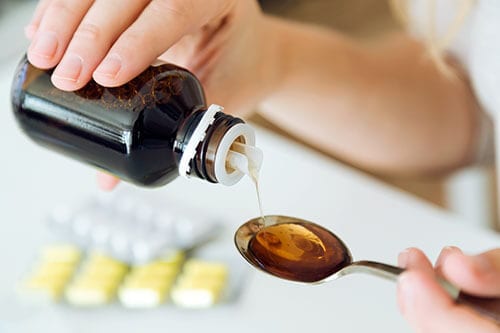When most people hear the word “opiates,” they think of painkillers like OxyContin and morphine or illicit drugs like heroin. However, codeine is an opiate that is used to relieve pain or suppress coughs. People may abuse it to achieve a euphoric high. They may also develop a tolerance even when they take it for its indicated purpose and develop a codeine addiction.
What Is Codeine?
 Codeine is a narcotic that is derived from the poppy plant. It is not as potent as morphine or most of the other opiate-based pain relievers. The guidelines that regulate codeine are not strict. The drug is often found in prescription cough syrups. It is frequently combined with acetaminophen for anti-inflammatory effects. According to some research, the evidence does not support codeine’s use for treating acute cough. Still, it is a widely prescribed, moderately powerful drug that has the potential to be abused.
Codeine is a narcotic that is derived from the poppy plant. It is not as potent as morphine or most of the other opiate-based pain relievers. The guidelines that regulate codeine are not strict. The drug is often found in prescription cough syrups. It is frequently combined with acetaminophen for anti-inflammatory effects. According to some research, the evidence does not support codeine’s use for treating acute cough. Still, it is a widely prescribed, moderately powerful drug that has the potential to be abused.
Codeine Dependency
When you start taking codeine, you may only need a small dosage to feel the effects. If you take the medication consistently over time, the same quantity doesn’t work as well. You may feel like you need more to achieve the desired results. A physical dependency occurs when you build up a tolerance to the drug. Although you may feel like the medication doesn’t work well anymore, you start to need the substance in your system in order to feel normal. The likelihood of developing a dependency is different for everyone. It varies based on your genes, history of drug use, the perceived need for the drug and other factors. Some people become hooked when they start taking codeine more often than they should. Others develop a dependency even when they take it according to the doctor’s orders.
Codeine Addiction
If you are dependent on codeine, you will experience withdrawal symptoms when you stop using the drug. An addiction develops when your behavior changes as a result of the drug use. You may become emotionally and psychologically reliant on the substance as you develop a tolerance. Some people who develop a codeine addiction ask their doctor to increase the dosage. If the medical professional restricts their access to the drug, they may use illegal or criminal methods to obtain it. The drug may negatively affect your financial, social, psychological, physical or emotional well being. Codeine is also the addictive ingredient in lean drink, purple drank or sizzurp. These names seem unusual. And, the concoction made infamous by celebrities is unusual as well. If you hear these names, you know that a codeine addiction may be coming.
Codeine Withdrawal
The first step to treating a codeine addiction is acknowledging that you have a problem. The second step is going through medical detox to eliminate the drug from your system and enrolling in an accredited rehab facility. When dependent on or addicted to a drug, you experience uncomfortable side effects when you stop using it. These symptoms of withdrawal may come on strong a few hours after your last dose. Different symptoms may appear as your body continues to attempt to balance itself out. Early withdrawal side effects usually include a rapid heartbeat, aching muscles, sweating, insomnia, runny nose, watery eyes, and irritability. Later signs of withdrawal may include diarrhea, loss of appetite, chills and abdominal pain. Depression is a withdrawal symptom that can last for several months after you quit using codeine.
Treatment For Codeine Addiction
A medical detox program can relieve withdrawal symptoms and help you begin recovery from a codeine addiction. It also helps you detox in the safest way. After you have eliminated the substance from your body, you can begin the process of physical and psychological healing. At Santé Center for Healing, we offer onsite medical detox as well as various levels of care for further addiction treatment programs. We offer a variety of therapies, including:
Our focus is on helping you achieve fulfillment in a life without drugs while preventing relapse. Find out how we can help you overcome your codeine addiction by calling 866-238-3154 today.






